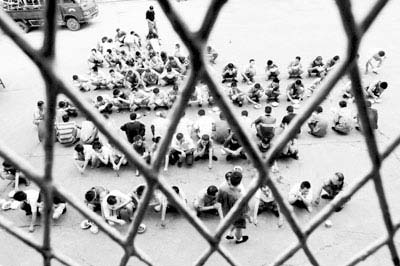(Clearwisdom.net) The Chinese Communist Party (CCP)'s 17th National Congress was recently held in Beijing. The National Congress is an event held once every five years, and is one of the most significant political events in today's China, in many ways charting the path the CCP will follow over the next five years.
An incident occurred just prior to the Congress which went virtually unnoticed. On October 18, 2007, Amnesty International wrote an open letter to Wu Bangguo, Chairman of the Standing Committee of the National People's Congress. The letter expressed hope that China would abolish their program of "reeducation through forced labor." Amnesty International voiced concern about recent attempts by the police in Beijing to expand the use of "reeducation through forced labor" and other forms of punitive administrative detention. The pretext of "needing to clean up the city" prior to the 2008 Olympic Games was challenged by Amnesty International. The letter urged legislators to replace "reeducation through forced labor" and fully comply with the standards for international human rights. This proposal by Amnesty International may be discussed by the Standing Committee this month.

People detained in labor camps
Detainees in Forced Labor Camps
During the 30th summit of the 10th Standing Committee of the National People's Congress, four pieces of legislation were passed. However, the legislation proposed to replace "reeducation through forced labor," the Illegal Behavior Correction Law, was not one of them. It was not even included in the summit agenda. The summit concluded on October 28.
China's "reeducation through forced labor" is long-standing. To meet the needs of "class struggle" in 1957 the State Council promulgated "Decision Regarding Re-education Through Labor" and there have been several amendments and supplements since that time. In 1982, the State Council submitted "Re-education through Labor Trial Measures" to the Public Security Ministry. These "Trial Measures" have lasted 25 years. The "1st Article of Re-education Through Labor" applies to those involved in violations of laws pertaining to "minor crime, counter-revolutionary activities, and crimes against the CCP or socialism that are deemed insufficient for criminal punishment." The purpose of this law is political persecution and it has currently become the main weapon for the CCP to persecute Falun Gong, family churches, lawyers, political dissidents and others who protect human rights.
The draft of the proposed "Illegal Behavior Correction Law" and the existing "Re-education through Forced Labor System" practices are essentially the same. According to people who participated in the revision, it is no more than a name change. The police department still controls "re-education through labor," however, if the detainee does not agree with that decision, they may protest, and appeal to the court. Few people attempt the appeal process, as everyone knows the process is meaningless.
Another so called "change" is that the detention period is to be from six months to no more than 18 months. However, the period of re-education through labor can actually be up to four years. Because the police department retains sole decision making power, people released after one year of "correction" can be taken back immediately and again "corrected." We know that many cases of consecutive "reeducation through forced labor" sentences occur. In such instances the change in detention time is of no significance to the police.
As for the change called "Implementation of Human Rights," I suggest everyone read attorney Gao Zhisheng's open letter to the highest CCP authorities. His letter was written after he personally investigated the torture of Falun Gong practitioners in forced labor camps.
How can a "re-education through forced labor system," something which violates China's Constitution, exist for half a century? Why is it that the "Illegal Behavior Correction Law," has essentially made no difference in the protection of human rights? And why couldn't the new version of the law be passed?
In theory, the National People's Congress is China's highest authority and is responsible for appointing the premier of the State Council. The Ministry of Public Security is one of the many subordinates of the State Council. It appears, however, that the Standing Committee of the National People's Congress, is unable to overcome opposition from the Ministry of Public Security. Even a simple "Illegal Behavior Correction Law," after four years of discussion and review, could not enter the legislative process.
The Ministry of Public Security is supposedly led by the State Council, but in fact it has another overlord. The CCP Central Committee Politics and Judiciary Committee is the real overlord of the Chinese judiciary system. The Ministries of Public Security, National Security and Judiciary all belong to the State Council. The highest courts and procurators belonging to the National People's Congress all listen to it.
The "reeducation through forced labor" system allows the public security system to wantonly deprive citizens of their freedom for up to four years, without any judiciary procedure. Thus, it has become a private punitive law of the public security system which is directly controlled by the CCP. "Re-education through forced labor" has become the most popular method used by the CCP in the persecution of Falun Gong. The majority of detainees in many forced labor c"Reeducation through forced labor" is the most direct means the CCP uses to violate human rights. As such, the public security department and its overlord, the Central Political and Judiciary Committee, wholeheartedly want to support this "law," not weaken it. This is the reason re-education through labor continues to exist even though it violates the constitution and basic human rights.
(Originally from Secret China)
Â





